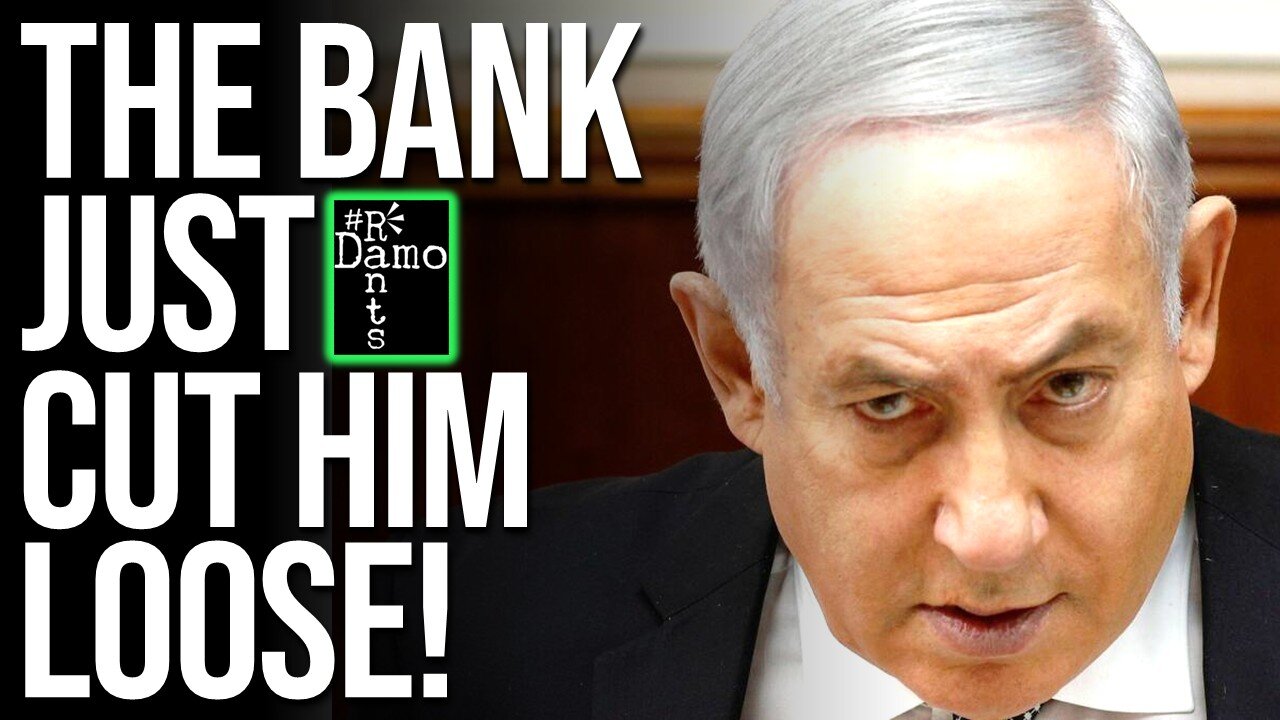Premium Only Content

Netanyahu Bet on Global Finance — And Norway Just Made Him Pay
Right, so Norway’s $2 trillion oil fund has just done something that Israel’s fiercest activists have spent decades dreaming about: it’s pulled the plug on a clutch of companies tied to occupation and war crimes — and it didn’t need a placard or a megaphone to do it. Instead the world’s most buttoned-up investors may have done more damage to Netanyahu’s economic fortunes in one afternoon than years of diplomatic finger-wagging, toothless UN resolutions, and carefully-worded “concerns” from European foreign ministries ever have.
For a government that insists BDS is the work of fringe radicals, this is an exquisitely awkward reversal: the boycott is coming from inside the boardroom. Not the activist’s board, the sovereign wealth board — a place where ties are tailored, voices are low, and decisions can move billions with a single line of ink.
Netanyahu can still count on American aid, the usual cover from certain European allies, and the complicity of corporate partners who have learned to hold their noses. But when one of the most conservative, establishment-minded funds on the planet starts trimming you out of its portfolio, the message is clear: the problem is no longer just moral, it’s financial too. And in the halls of global finance, that kind of stain is far harder to scrub away.
Right, so just the other morning in Oslo, one of Norway’s most respected daily, Aftenposten, published an exposé that would reverberate far beyond the Nordic press. The paper revealed that the Government Pension Fund Global (GPFG) — better known internationally as the Norwegian Oil Fund — had significantly increased its stake in Bet Shemesh Engines, an Israeli aerospace manufacturer with openly declared contracts to supply and maintain engines for combat aircraft used by the Israeli military. On its own corporate website, Bet Shemesh proudly advertises its work with the Israeli Air Force. Rights groups and war monitors have repeatedly identified those aircraft as among those deployed in airstrikes on Gaza that have destroyed residential blocks, schools, medical facilities, and civilian infrastructure, with casualty figures running into the thousands. The United Nations has documented repeated strikes on clearly civilian targets, and the International Court of Justice (ICJ), in its ongoing genocide case against Israel, has already determined that there is “plausible” evidence of genocidal intent in the conduct of these operations.
So the optics for Norway have been catastrophic. The Oil Fund has a globally recognised ethical investment mandate embedded in law. It is designed, in theory, to prevent precisely this kind of complicity — an investor profiting from companies directly tied to breaches of international humanitarian law. Yet here it was, not only holding shares in Bet Shemesh but, according to Aftenposten, significantly increasing its position during the very months that Israeli air power was laying waste to Gaza. Opposition politicians in Norway immediately demanded answers, and some went further still, calling on Nicolai Tangen, the high-profile chief executive of Norges Bank Investment Management (NBIM), to resign.
That pressure produced one of the swiftest reversals in the Oil Fund’s history. Within days, NBIM announced that it had sold its entire stake in Bet Shemesh Engines. The move was not isolated: it came alongside the disposal of holdings in ten other Israeli companies, the termination of all contracts with external asset managers handling Israeli investments, and the transfer of the remaining Israel portfolio to in-house management. As of 30 June this year, that portfolio comprised 61 companies; after the August disposals, 50 remain and all are under review now. NBIM’s deputy chief executive, Trond Grande, was candid when speaking to Reuters: there was, he said, “good reason to believe there will be further sell-outs” when the review reports to Norway’s Finance Ministry on 20 August, they aren’t hanging around here.
The financial facts are not in dispute. The GPFG is the largest sovereign wealth fund in the world, with assets totalling around $2 trillion. Its Israeli exposure, at roughly $2 billion, represents a fraction of its total portfolio but a non-trivial slice of Israel’s market. The 11 companies sold in August were all outside the Finance Ministry’s benchmark index, meaning they were actively chosen holdings rather than passive index positions. These sales came in addition to older exclusions, made on the formal recommendation of Norway’s Council on Ethics, of 11 other Israeli companies for their operations in the occupied West Bank. The August disposals, however, were not the product of that formal exclusion process; they were discretionary actions taken by NBIM itself in response to ethical concerns and reputational risk.
The choice of Bet Shemesh Engines as the first scalp was telling though. This is not a diversified conglomerate with a tangential role in military production. It is a dedicated aerospace manufacturer whose business model is inseparable from Israel’s war machine. In supplying and servicing jet engines for the Israeli Air Force, it plays a direct and ongoing role in enabling operations in Gaza. Those operations have been condemned by the UN, the World Health Organization, and multiple human rights organisations, not only for their scale but for their apparent targeting patterns. When NBIM’s increased stake came to light, it looked like nothing less than a moral and governance failure — and for a fund that sets itself up as the global benchmark in responsible investing, that is not survivable.
While the immediate market impact on Israel of selling 11 companies’ worth of NBIM shares is, in pure numbers, modest, the symbolic weight is far greater. The Oil Fund is not an activist vehicle chasing headlines; it is the most conservative, systemically significant long-term investor in the world. When it decides that certain companies are off-limits, that decision sends a signal to the entire institutional investment community. And signals can move markets as much as cash. And this signal is not a whisper — it is a klaxon blast echoing from Oslo to every investment committee in the Western world.
Israel’s capital markets are peculiarly vulnerable to such signals. Around 40 per cent of the Tel Aviv Stock Exchange’s market capitalisation is held by foreign investors, a much higher proportion than is typical for an emerging-market-classified economy. Its high-technology sector — the pride of Netanyahu’s economic narrative — depends disproportionately on foreign venture capital, multinational corporate R&D budgets, and global integration into supply chains. Foreign direct investment into Israel fell by 29 per cent in 2023, reaching its lowest level since 2016, even before the current wave of divestment gathered pace. It is not news that Israel’s economy is already not in a good place and this is now set to worsen, albeit symbolically now, but the knock on effect could prove catastrophic. That decline reflects not just the war in Gaza but also political instability and investor discomfort with judicial overhaul plans and democratic backsliding.
But the deeper threat to Netanyahu’s government is that precedent. Norway’s GPFG has a history of being the first domino in a chain of divestment that other funds quickly follow. In the late 1980s, when the fund’s precursor excluded companies tied to apartheid South Africa, it gave political and reputational cover to other European funds to do the same. In the 2000s, when the Council on Ethics recommended excluding companies linked to Myanmar’s military junta and Sudan’s Darfur atrocities, Dutch, Danish, and other European pension funds applied similar screens within months. When the Oil Fund began divesting from coal in 2015–2019 on climate grounds, it accelerated a global shift in capital allocation away from coal producers, drawing in funds from California to New Zealand.
The sequence is recognisable therefore: Norway moves first, citing its mandate; peer funds follow, often under parliamentary or civil society pressure; private capital reacts, adjusting its risk pricing and coverage; the target country or sector faces higher borrowing costs, lower liquidity, and shrinking foreign ownership. If this pattern repeats, the August 20 review could mark the pivot point. A decision to exit the remaining 50 Israeli holdings would normalise large-scale, state-led divestment from Israel in the mainstream investment world. The most likely early adopters of that precedent are sovereign and pension funds in the Netherlands, Denmark, Ireland, and New Zealand, all of which have similar human rights clauses in their mandates and have acted in concert with Norway in past exclusions.
Signs of this cascade are already visible. In the past year, Norway’s Storebrand, France’s AXA, and the Irish Strategic Investment Fund have reduced or exited Israel-linked holdings, particularly in banks and settlement-related industries. Universities in Copenhagen, Dublin, Ghent, and Waterloo have divested from companies operating in the West Bank. The UK’s Universities Superannuation Scheme sold approximately £80 million in Israeli bonds in 2024. European insurers such as UniCredit have put Israel on their restricted lists. This is reputational contagion in action: once a major, mainstream institution takes the plunge, it becomes politically and legally easier for others to do the same.
For Netanyahu, the political damage is layered. Domestically, it undermines his claim to be the architect of Israel’s economic resilience. For years, he has argued that the country’s globalised, innovation-driven economy can weather diplomatic storms without losing investor confidence. The GPFG’s divestment undercuts that narrative completely. Internationally, it binds the genocide accusations against his government to tangible economic consequences. This is not an NGO campaign; it is the world’s largest sovereign investor saying, in effect, that doing business with certain parts of the Israeli economy is too ethically and reputationally costly. That makes it harder for Israeli diplomats to dismiss such moves as fringe or antisemitic.
The scale of potential escalation is significant. If NBIM sells all 50 remaining Israeli holdings, the direct short-term market effect — perhaps $1–1.8 billion in selling pressure — would be absorbable. But the indirect effects could be severe. Persistent foreign selling would raise equity and bond risk premia, increasing the cost of capital for both the state and private issuers. Lower market capitalisation in key stocks could trigger index re-weighting, reducing Israel’s weight in global equity benchmarks and further depressing passive inflows. FDI could chill further if large corporates perceive growing reputational risk in expanding in Israel. Sustained capital outflows could put downward pressure on the shekel, raising import costs and stoking inflation. If NBIM pulls the trigger on the rest, the question will not be whether Israel can weather the storm — but who, and how many, will follow in Norway’s wake?
The August 20 review is therefore more than a portfolio housekeeping exercise; it is a geopolitical event in and of itself with massive market-moving potential. Two scenarios present themselves. In the first, NBIM makes only minimal further changes, selling a handful of additional companies and framing the process as an exceptional adjustment in response to unique circumstances. Israel’s government would spin this as the end of the matter. In the second, NBIM executes a broad exit, signalling that it has deemed a large share of the Israeli economy ethically off-limits. This would embolden other funds to follow and mark the start of a structural change in Israel’s investment climate. Given NBIM’s precedent in similar cases, the political climate in Norway, and the international momentum for ethical investment, the latter outcome appears more probable.
The GPFG’s divestment is not the first act of institutional resistance to Israel’s occupation and military conduct, but it may be the most consequential. It collapses the firewall that Israel has long tried to maintain between its political legitimacy and its economic attractiveness. When that wall cracks, the fissures can widen rapidly. If August 20 brings a sweeping decision, it could be remembered as the moment when capital markets began to enforce the international norms Israel has spent decades evading.
Norway’s GPFG does not act rashly. Its Council on Ethics applies stringent criteria and moves only when there is documented evidence of serious norm violations — and yet, once it moves, the ripples often turn into waves. Understanding these precedents is essential to appreciating why its divestment now from Israeli companies is far more dangerous to Israel than the raw numbers suggest.
In the late 1980s, well before the fund reached its current scale, Norway took the politically charged decision to exclude companies operating in apartheid South Africa. This was not financially transformative for South Africa on its own — Norway’s holdings were small by today’s standards — but it broke a taboo among Western state investors. Other Nordic funds followed within months, then Dutch and Canadian funds, and soon large private institutions began treating South African assets as politically toxic. The capital squeeze did not cause the end of apartheid by itself, but it created an unmistakable economic headwind that the ruling regime could not ignore.
The pattern repeated in the 2000s. When the Council on Ethics recommended exclusion of companies linked to Myanmar’s military junta — notably those complicit in forced labour in resource extraction — the GPFG sold its holdings. Dutch and Danish pension funds soon mirrored the exclusion, citing Norway’s research. Companies found themselves blacklisted by multiple large state investors within a year. In some cases, the reputational damage outweighed the lost capital, prompting corporate withdrawals from Myanmar.
Sudan’s Darfur atrocities, still very much ongoing sadly, but back in the mid-2000s they triggered another wave. The GPFG exited oil companies financing the regime’s operations, and other European funds again took their cue. The move did not collapse Sudan’s finances overnight, but it added pressure alongside sanctions and diplomatic isolation, helping to push the regime into a peace process, one that sadly hasn’t held.
Even in the less politically explosive realm of climate policy, the GPFG has been a catalyst. Its multi-year coal divestment programme, initiated in 2015, did not sink the global coal industry on its own — but it mainstreamed the idea that fossil fuels carried not just environmental but fiduciary risk. Large funds in California, New Zealand, and France cited Norway’s precedent in justifying their own exits. Capital shifted accordingly, and coal companies found financing more expensive and harder to secure.
The lesson in each case is that Norway’s divestment decisions are rarely isolated events. They legitimise similar action elsewhere and signal to the market that a particular set of assets has crossed an ethical and reputational threshold. Once that line is crossed, capital tends to keep flowing out.
If NBIM’s August 20 review results in a sweeping exit — and if, as precedent suggests, other funds follow — the impact will not be evenly spread across Israel’s economy. Some sectors are more exposed, both in terms of foreign capital reliance and reputational risk.
Banking and Financial Services are highly vulnerable. Several of Israel’s largest banks have documented involvement in financing settlement construction in the occupied West Bank. Such activities have already led to exclusions by European funds under OECD guidelines. A coordinated exit by major sovereign and pension funds could raise these banks’ cost of capital and make them less attractive to ESG-conscious institutional investors.
Construction and Infrastructure firms, particularly those active in settlement building, face similar risks. These companies often have contracts tied directly to West Bank projects and could become targets for exclusion under EU human rights due diligence frameworks now in development.
Defence and Aerospace is perhaps the most obvious exposure. Firms like Bet Shemesh Engines are directly linked to the Gaza campaign, and others supply weapons, munitions, and surveillance technology. While Israel’s defence sector is export-oriented, it relies on global capital markets for its R&D funding. Losing access to major pools of ethical capital could slow investment and make financing more expensive.
Technology — Israel’s prized “Startup Nation” sector — is not immune either. While most tech firms are not directly tied to the occupation, their reputations can be damaged by association, particularly if they supply the Israeli government or military. The tech sector is also the most mobile; companies already nervous about political instability may choose to move away, many have already done this or shift R&D abroad if they see a trend of large investors exiting that Israeli market.
Telecommunications and Utilities have already been targeted by past exclusions for operating in settlements. These sectors are less glamorous but are often heavily represented in index funds, meaning a coordinated exit could affect their index weights and passive inflows.
The outcome of NBIM’s review will resonate far beyond Oslo therefore.
A sweeping exit, would be transformative. If the GPFG sells the bulk of its remaining Israeli holdings, it will have effectively declared a large part of the Israeli economy incompatible with its ethical mandate. That would embolden other funds to follow suit, especially in Europe, where ESG norms are most advanced. It could dovetail with EU-level moves to strengthen human rights due diligence laws, potentially making investment in settlement-linked firms legally risky for European managers.
Such a move would also feed into the broader Boycott, Divestment, and Sanctions (BDS) momentum. Israel has long fought to keep state-level and mainstream institutional actors from joining BDS-aligned actions, framing such moves as fringe or antisemitic because of course they do. A GPFG-led cascade would blow that framing apart. It would also interact with ongoing legal processes at the ICJ and ICC; any finding of genocide or war crimes would make it almost impossible for ethically mandated funds to justify holding certain Israeli assets.
From a geopolitical perspective, the message would be stark: even close Western partners are no longer willing to separate Israel’s economic integration from its political and military conduct. For Netanyahu, that would represent a collapse of a core strategic assumption that has underpinned his governance for decades. Will August 20 be remembered as the day Israel’s financial defences began to crumble — or as the moment the world blinked? Certainly its squeaky bum time for some ahead of that.
The Norwegian Oil Fund’s August divestment from 11 Israeli companies, catalysed by the Bet Shemesh Engines scandal, is more than a moral gesture. It is a market signal from the most systemically important sovereign investor in the world that certain aspects of Israel’s economy are too ethically compromised to hold. History shows that such signals rarely stay contained.
If the August 20 review brings a sweeping exit, the precedent will be set, the early adopters will move, and the slow drip of capital away from Israel could become a structural outflow. That would raise borrowing costs, depress valuations, chill foreign investment, and strain the shekel. More importantly, it would shatter the narrative that Israel’s economic attractiveness is insulated from its political and military actions.
The wall between legitimacy and capital is cracking. In the past, when Norway made such a move — against apartheid, against genocide, against environmental destruction — others followed, and the targets felt the strain. If history repeats, Israel may soon find that the most dangerous battlefield is not in Gaza or the West Bank, but in the quiet corridors of global capital where reputations, once lost, are almost impossible to buy back.
It's not just Nordic countries like Norway causing Netanyahu a headache right now over issues he might have considered untouchable either, it is also coming from within the Middle East as a new plan that might secure Israel oil pipelines from Azerbaijan might have no become a target for Iran and that has surely only increased amid rumours of another Israeli assault on Iran before the year is out. Get all the details of that story in this video recommendation here as your suggested next watch.
Please do also hit like, share and subscribe if you haven’t done so already so as to ensure you don’t miss out on all new daily content as well as spreading the word and helping to support the channel at the same time which is very much appreciated, holding power to account for ordinary working class people and I will hopefully catch you on the next vid. Cheers folks.
-
 LIVE
LIVE
Caleb Hammer
11 hours ago$300,000 Of Debt To "Flee Trump’s America" | Financial Audit
89 watching -

The Big Mig™
2 hours agoNow We Know Why They Raided Mar A Lago!
1317 -
 LIVE
LIVE
Badlands Media
5 hours agoBadlands Daily: October 6, 2025
4,222 watching -
 1:43:31
1:43:31
Dear America
3 hours agoDems Are The Party Of MURDER?! + TPUSA Debunks Claim By Candace Owens!
70.8K42 -
 30:00
30:00
BEK TV
4 days agoGUT HEALTH AND THE POWER OF KIMCHI WITH KIM BRIGHT ON TRENT ON THE LOOS
94.3K9 -
 LIVE
LIVE
Total Horse Channel
14 hours agoLow Roller Reining Classic | Main Arena | October 6th, 2025
17 watching -
 LIVE
LIVE
Matt Kohrs
12 hours agoStock Market Open: MONSTER GAINS || Live Trading Futures & Options
501 watching -
 LIVE
LIVE
Wendy Bell Radio
6 hours agoDemocrats Need To Look In The Mirror
7,526 watching -
 1:01:43
1:01:43
Chad Prather
23 hours agoEven Now!! Is It Too Late For A Miracle?
48K23 -
 1:20:19
1:20:19
JULIE GREEN MINISTRIES
4 hours agoLIVE WITH JULIE
100K160
